Memoir of John Shakespear Bartley, 1916-1919 - Part 22
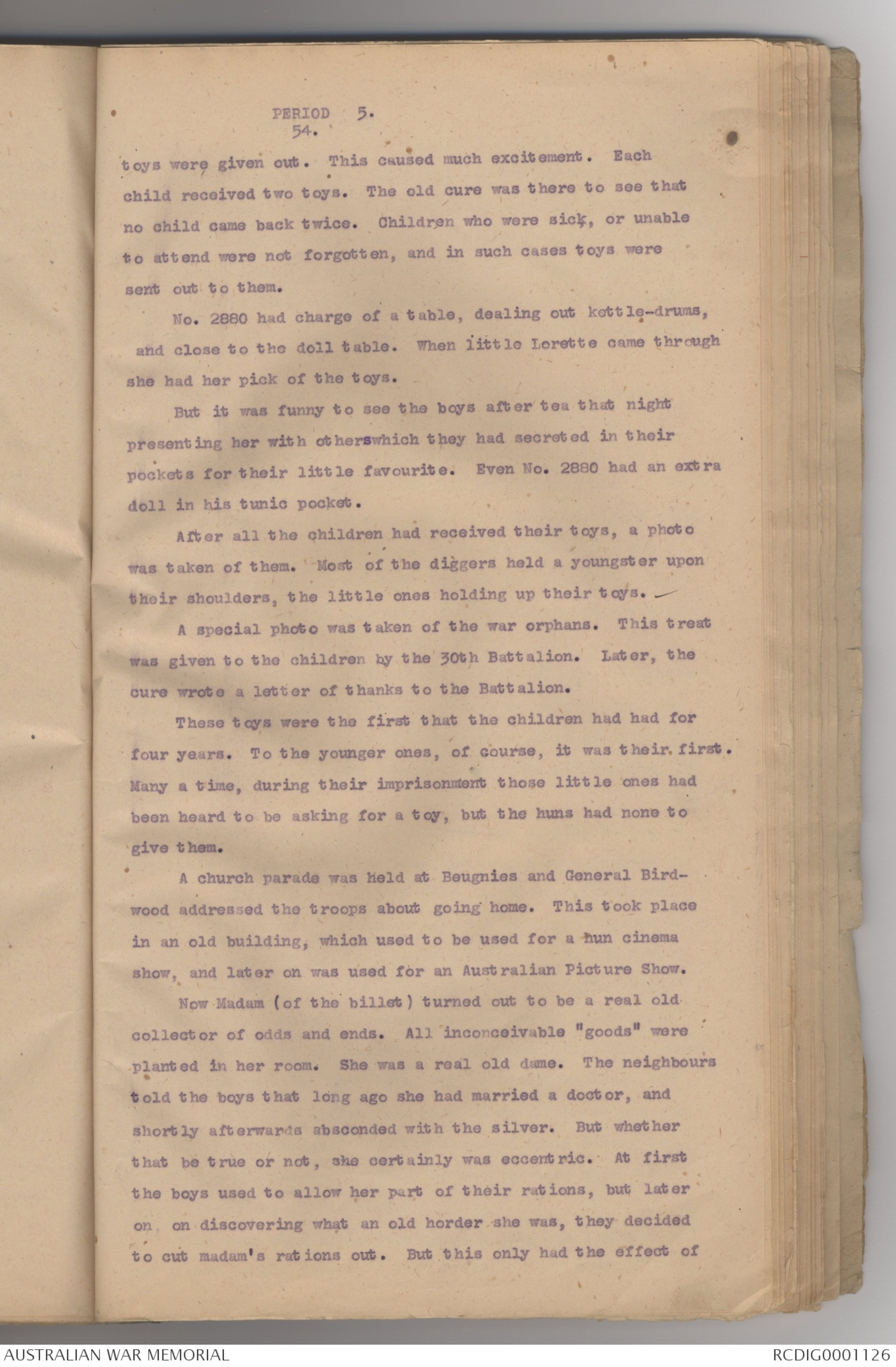
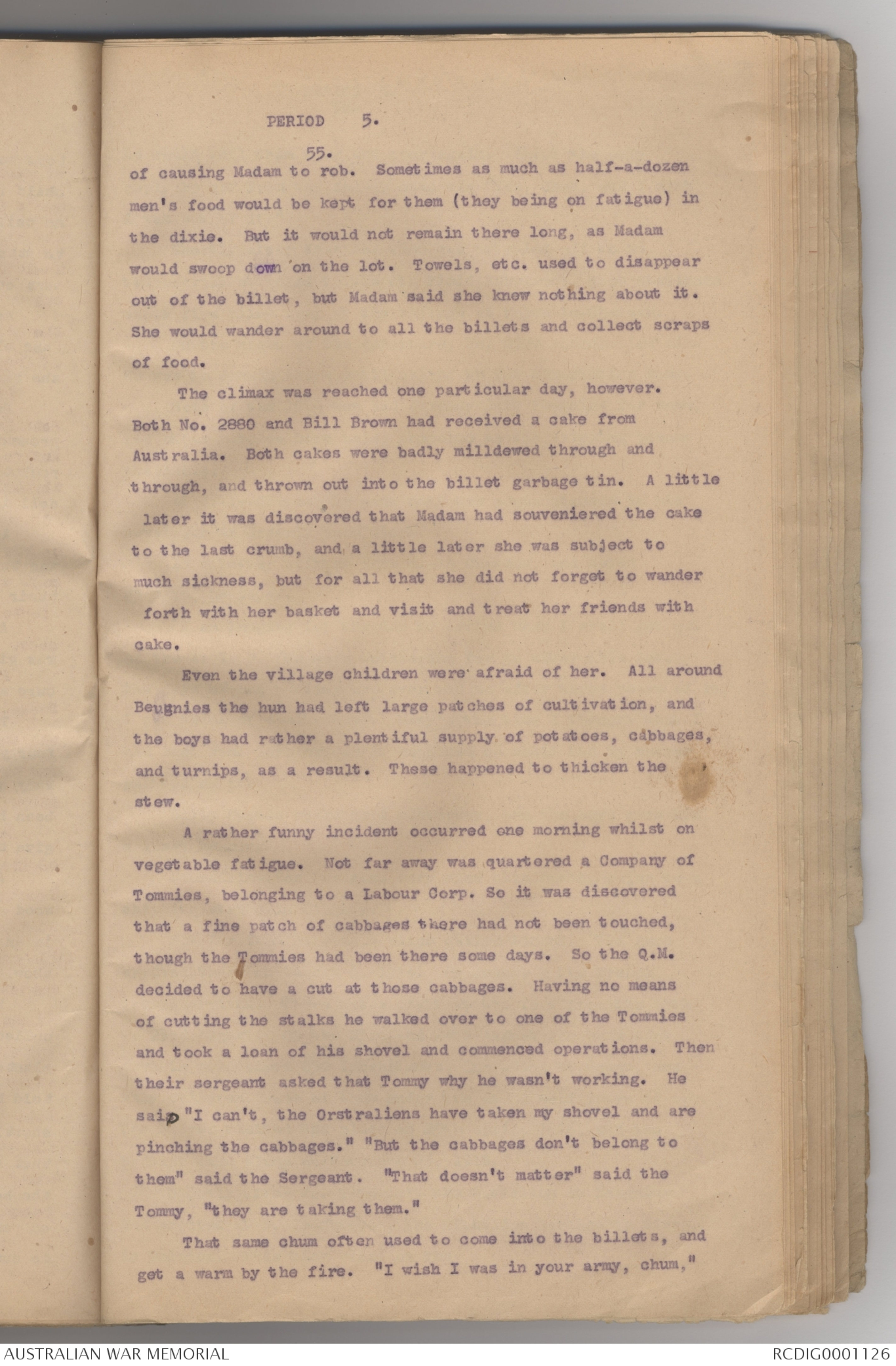
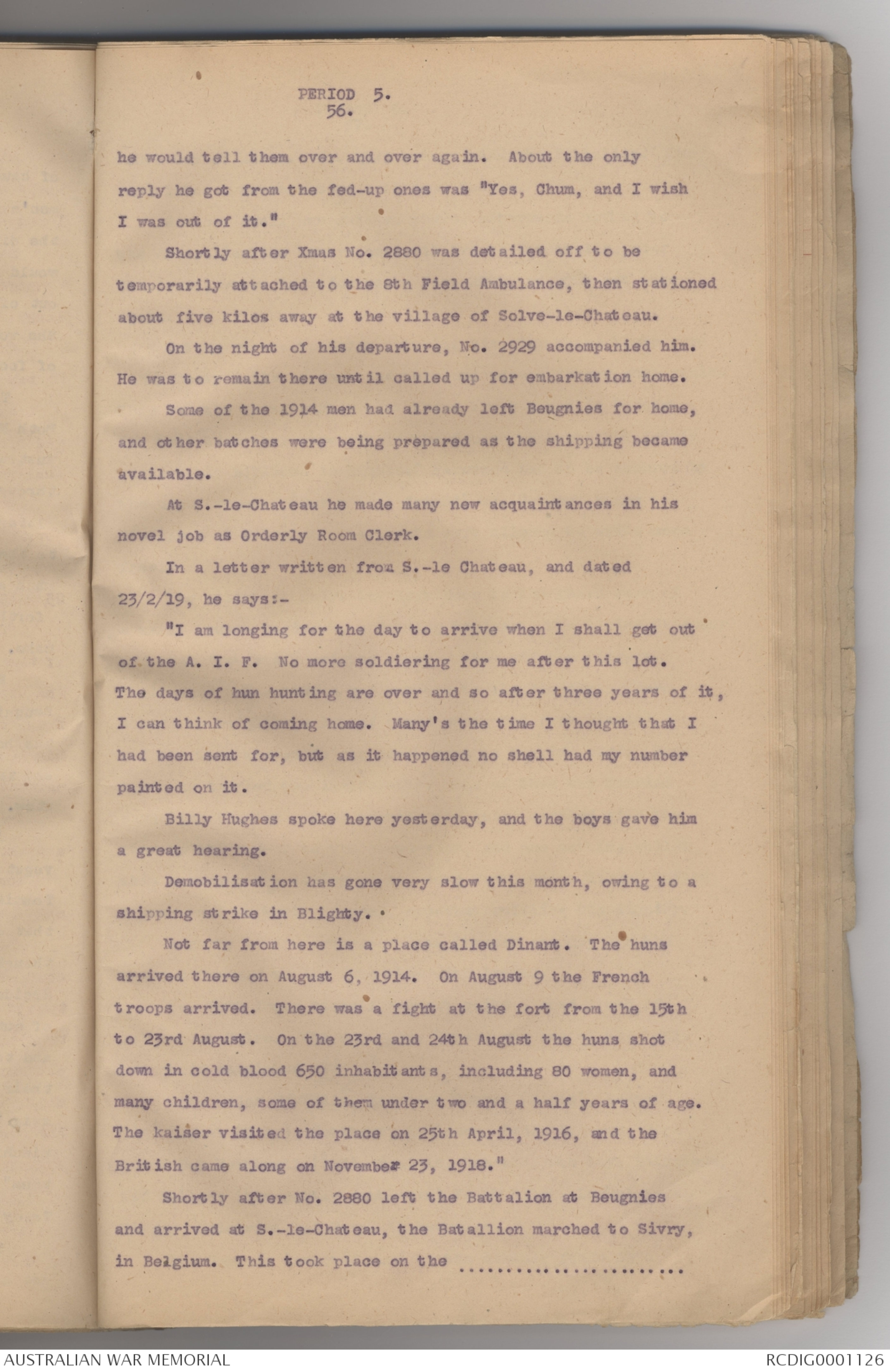
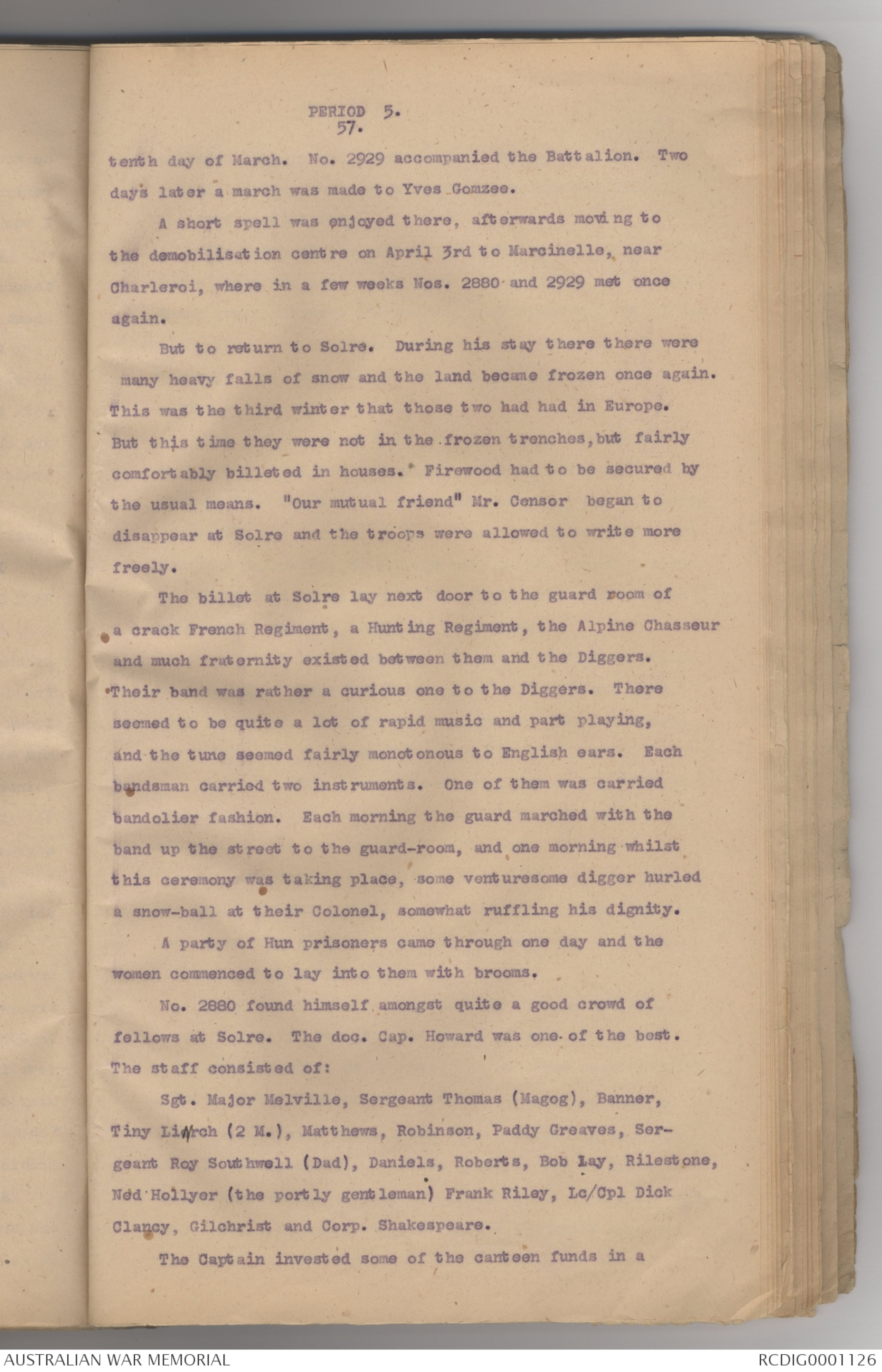
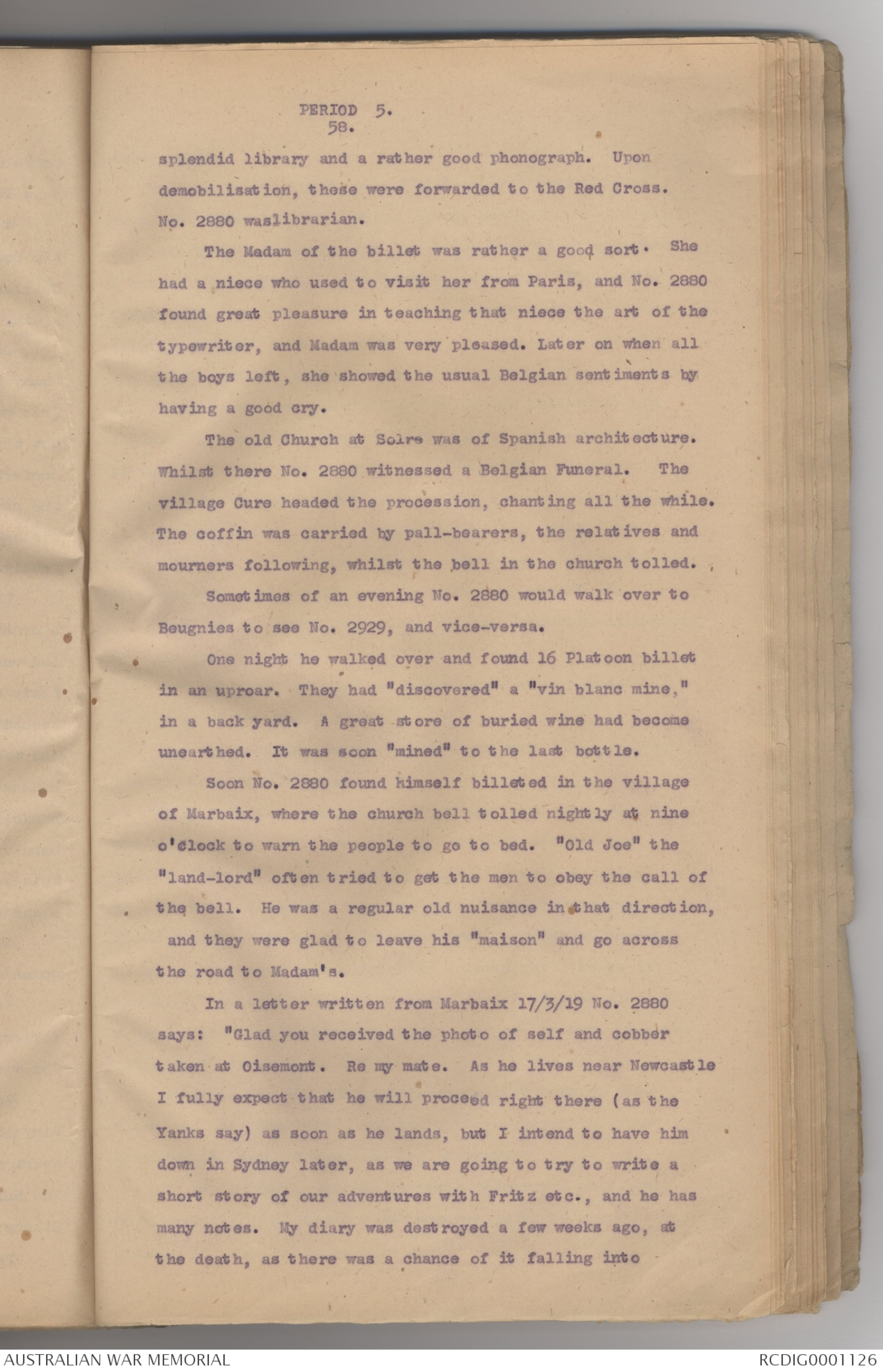
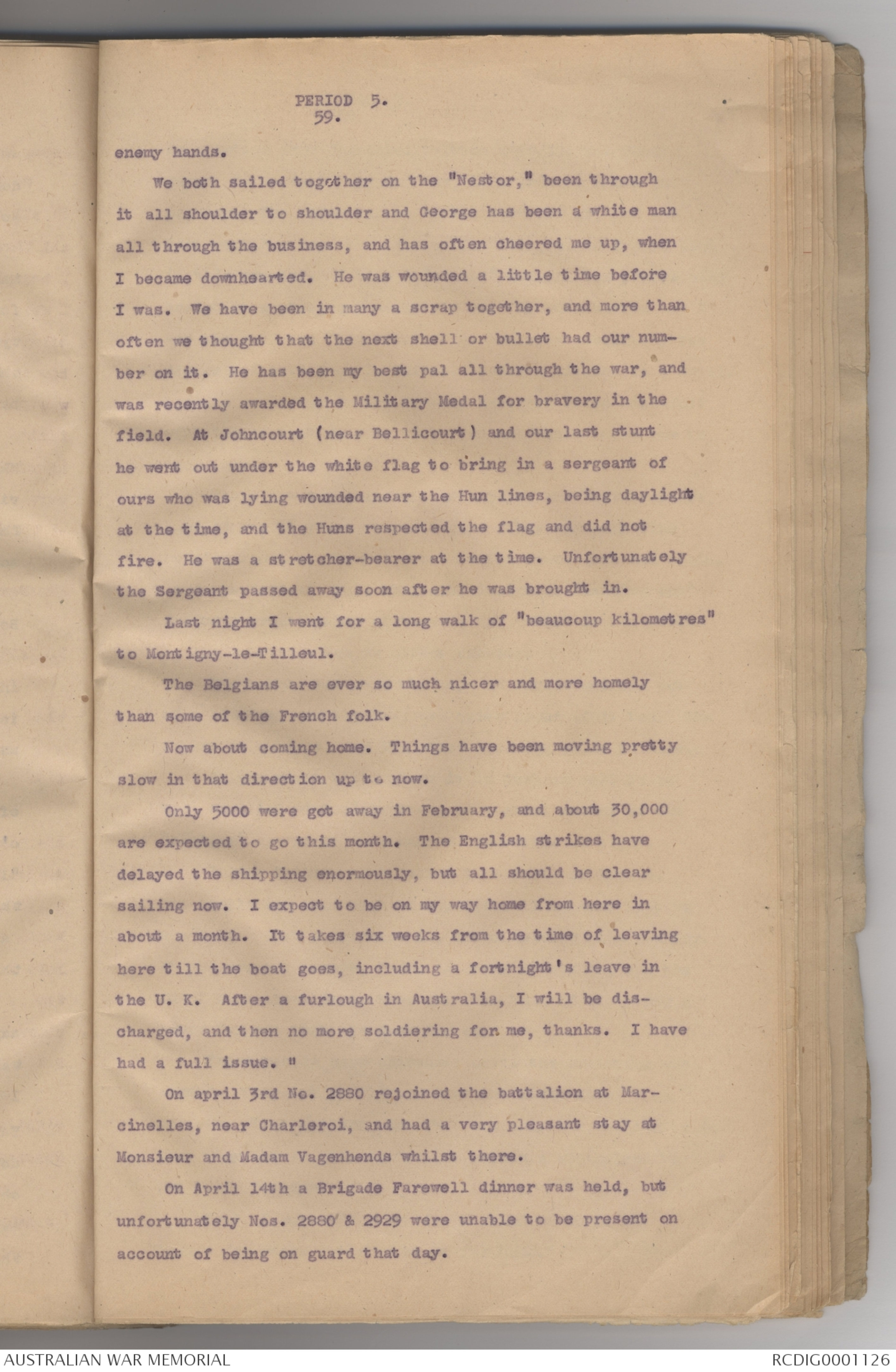
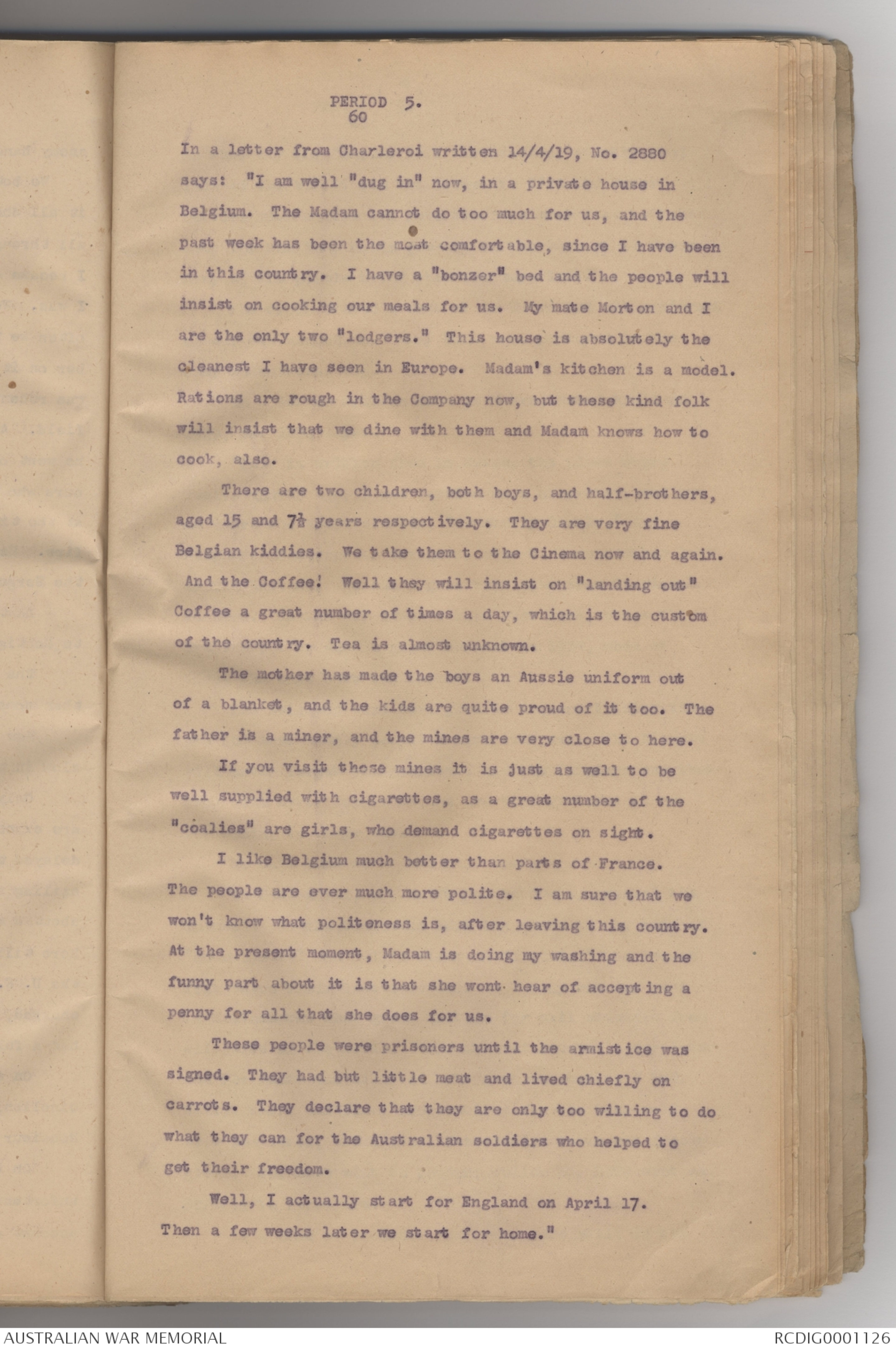
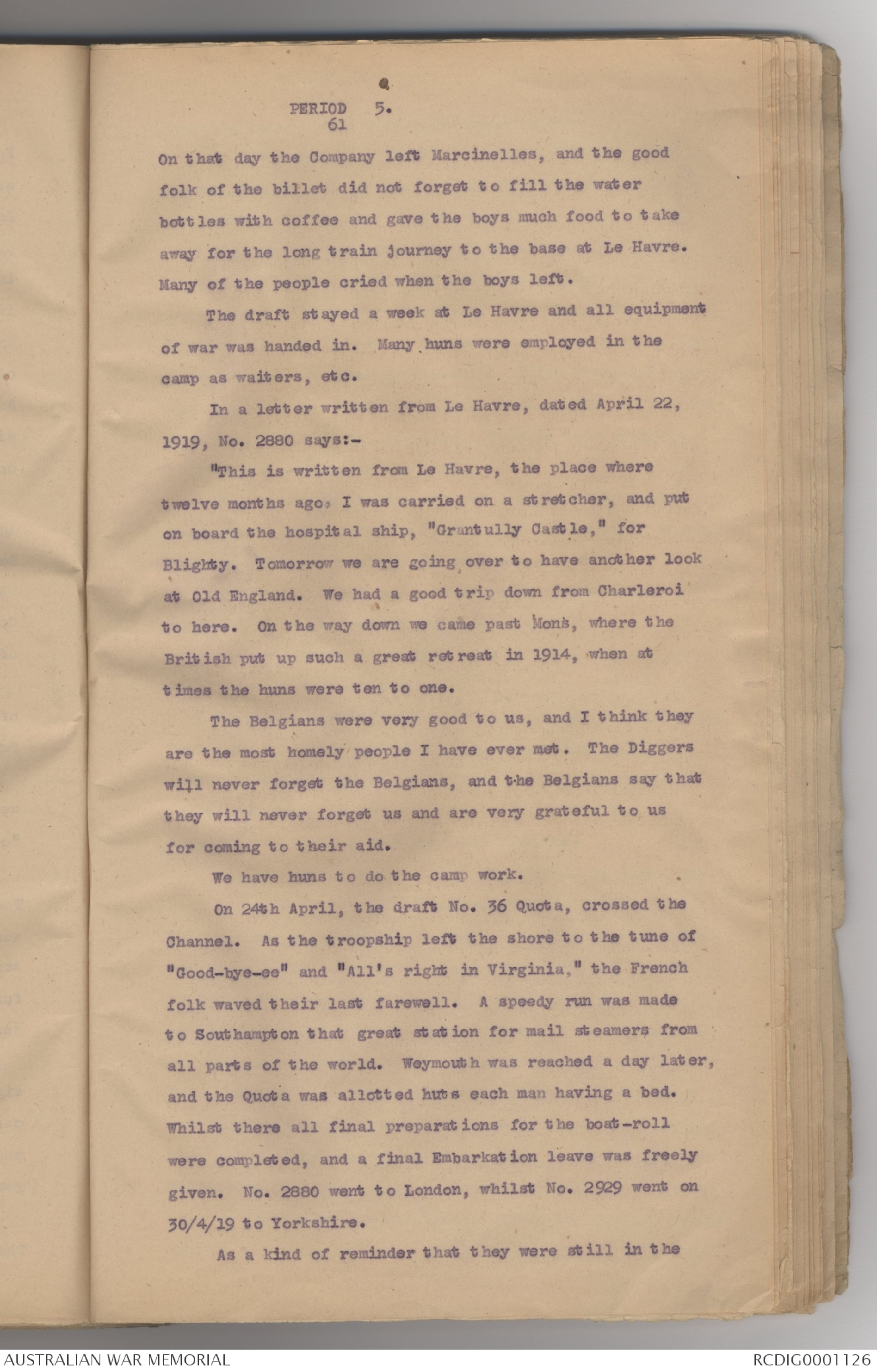
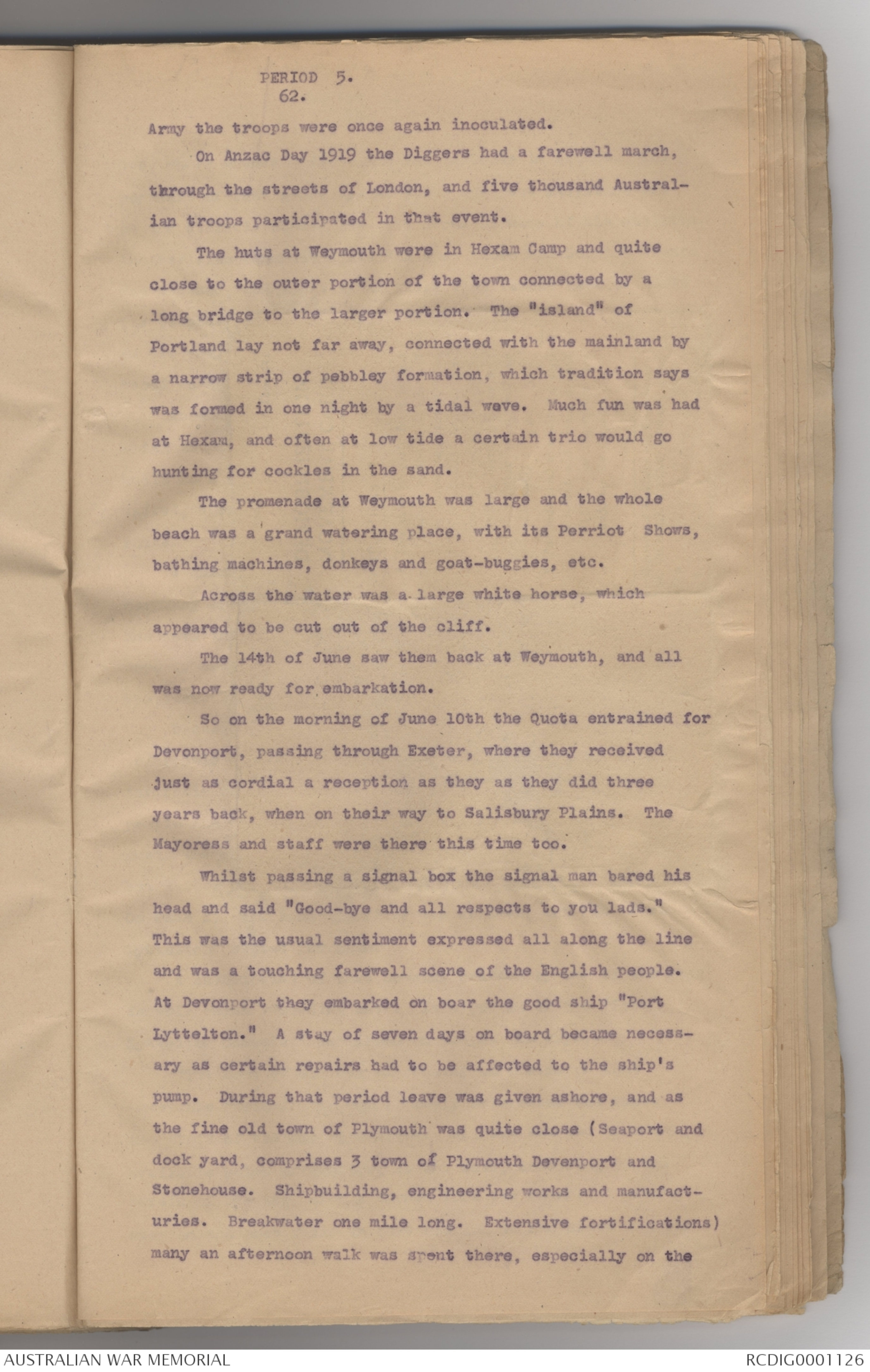
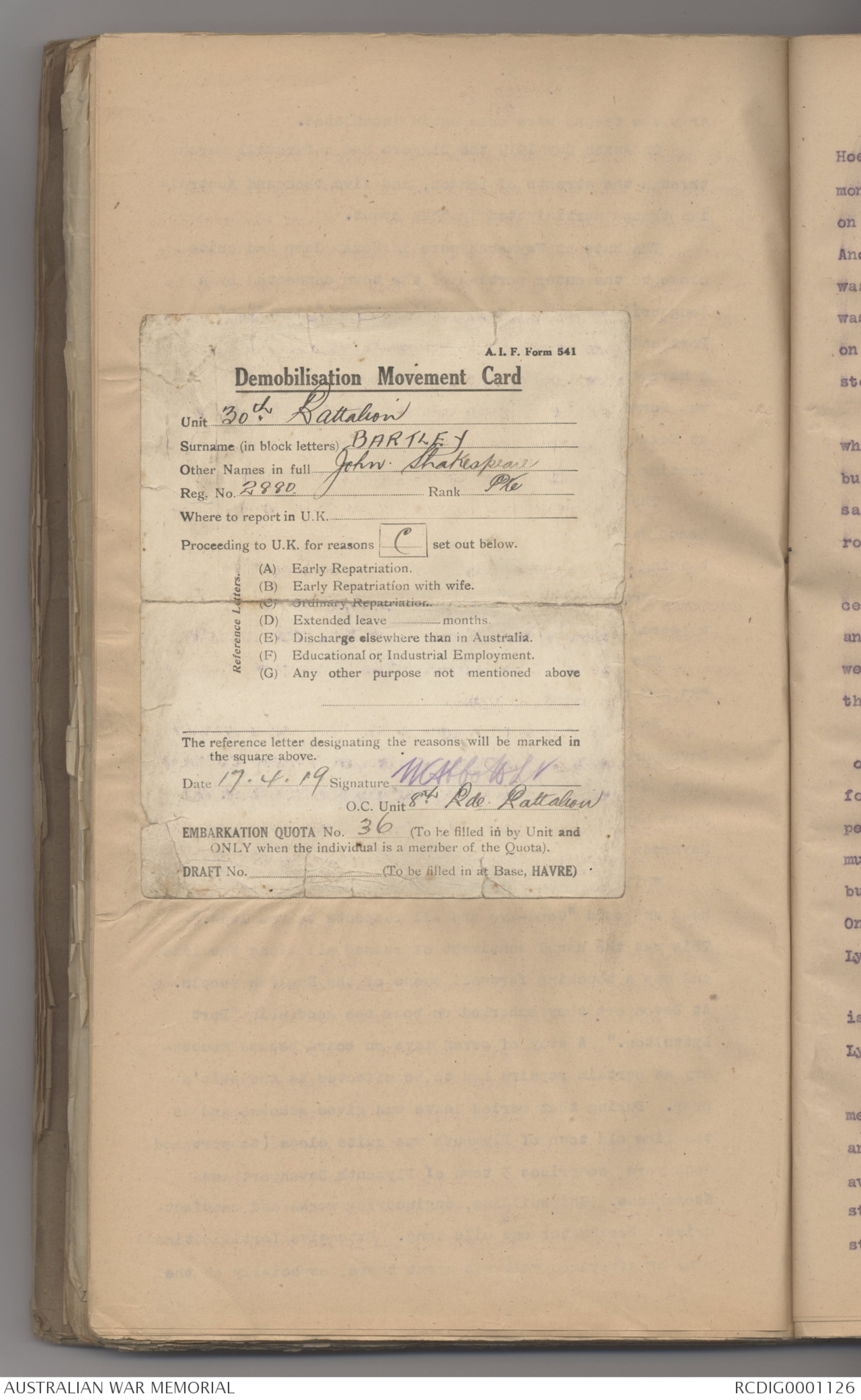
PERIOD 5.
54.
toys were given out. This caused much excitement. Each
child received two toys. The old cure was there to see that
no child came back twice. Children who were sick, or unable
to attend were not forgotten, and in such cases toys were
sent out to them.
No. 2880 had charge of a table, dealing out kettle-drums,
and close to the doll table. When little Lorette came through
she had her pick of the toys.
But it was funny to see the boys after tea that night
presenting her with others which they had secreted in their
pockets for their little favourite. Even No. 2880 had an extra
doll in his tunic pocket.
After all the children had received their toys, a photo
was taken of them. Most of the diggers held a youngster upon
their shoulders, the little ones holding up their toys.
A special photo was taken of the war orphans. This treat
was given to the children by the 30th Battalion. Later, the
cure wrote a letter of thanks to the Battalion.
These toys were the first that the children had had for
four years. To the younger ones, of course, it was their first.
Many a time, during their imprisonment those little ones had
been heard to be asking for a toy, but the huns had none to
give them.
A church parade was Held at Beugnies and General Birdwood
addressed the troops about going home. This took place
in an old building, which used to be used for a hun cinema
show, and later on was used for an Australian Picture Show.
Now Madam (of the billet) turned out to be a real old
collector of odds and ends. All inconceivable "goods" were
planted in her room. She was a real old dame. The neighbours
told the boys that long ago she had married a doctor, and
shortly afterwards absconded with the silver. But whether
that be true or not, she certainly was eccentric. At first
the boys used to allow her part of their rations, but later
on, on discovering what an old horder she was, they decided
to cut madam's rations out. But this only had the effect of
PERIOD 5.
55.
of causing Madam to rob. Sometimes as much as half-a-dozen
men's food would be kept for them (they being on fatigue) in
the dixie. But it would not remain there long, as Madam
would swoop down on the lot. Towels, etc. used to disappear
out of the billet, but Madam said she knew nothing about it.
She would wander around to all the billets and collect scraps
of food.
The climax was reached one particular day, however.
Both No. 2880 and Bill Brown had received a cake from
Australia. Both cakes were badly milldewed through and
through, and thrown out into the billet garbage tin. A little
later it was discovered that Madam had souveniered the cake
to the last crumb, and a little later she was subject to
much sickness, but for all that she did not forget to wander
forth with her basket and visit and treat her friends with
cake.
Even the village children were afraid of her. All around
Beugnies the hun had left large patches of cultivation, and
the boys had rather a plentiful supply of potatoes, cabbages,
and turnips, as a result. These happened to thicken the
stew.
A rather funny incident occurred one morning whilst on
vegetable fatigue. Not far away was quartered a Company of
Tommies, belonging to a Labour Corp. So it was discovered
that a fine patch of cabbages there had not been touched,
though the Tommies had been there some days. So the Q.M.
decided to have a cut at those cabbages. Having no means
of cutting the stalks he walked over to one of the Tommies
and took a loan of his shovel and commenced operations. Then
their sergeant asked that Tommy why he wasn't working. He
said "I can't, the Orstraliens have taken my shovel and are
pinching the cabbages." "But the cabbages don't belong to
them" said the Sergeant. "That doesn't matter" said the
Tommy, "they are taking them."
That same chum often used to come into the billets, and
get a warm by the fire. "I wish I was in your army, chum,"
PERIOD 5.
56.
he would tell them over and over again. About the only
reply he got from the fed-up ones was "Yes, Chum, and I wish
I was out of it."
Shortly after Xmas No. 2880 was detailed off to be
temporarily attached to the 8th Field Ambulance, then stationed
about five kilos away at the village of Solve-le-Chateau.
On the night of his departure, No. 2929 accompanied him.
He was to remain there until called up for embarkation home.
Some of the 1914 men had already left Beugnies for home,
and other batches were being prepared as the shipping became
available.
At S.-le-Chateau he made many new acquaintances in his
novel job as Orderly Room Clerk.
In a letter written from S.-le Chateau, and dated
23/2/19, he says:-
"I am longing for the day to arrive when I shall get out
of the A. I. F. No more soldiering for me after this lot.
The days of hun hunting are over and so after three years of it,
I can think of coming home. Many's the time I thought that I
had been sent for, but as it happened no shell had my number
painted on it.
Billy Hughes spoke here yesterday, and the boys gave him
a great hearing.
Demobilisation has gone very slow this month, owing to a
shipping strike in Blighty.
Not far from here is a place called Dinant. The huns
arrived there on August 6, 1914. On August 9 the French
troops arrived. There was a fight at the fort from the 15th
to 23rd August. On the 23rd and 24th August the huns shot
down in cold blood 650 inhabitants, including 80 women, and
many children, some of them under two and a half years of age.
The kaiser visited the place on 25th April, 1916, and the
British came along on November 23, 1918."
Shortly after No. 2880 left the Battalion at Beugnies
and arrived at S.-le-Chateau, the Batallion marched to Sivry,
in Belgium. This took place on the . . . . . . . . . . . . . . . . . . . . . . . .
PERIOD 5.
57.
tenth day of March. No. 2929 accompanied the Battalion. Two
days later a march was made to Yves Gomzee.
A short spell was enjoyed there, afterwards moving to
the demobilisation centre on April 3rd to Marcinelle, near
Charleroi, where in a few weeks Nos. 2880 and 2929 met once
again.
But to return to Solre. During his stay there there were
many heavy falls of snow and the land became frozen once again.
This was the third winter that those two had had in Europe.
But this time they were not in the frozen trenches, but fairly
comfortably billeted in houses. Firewood had to be secured by
the usual means. "Our mutual friend" Mr. Censor began to
disappear at Solre and the troops were allowed to write more
freely.
The billet at Solre lay next door to the guard room of
a crack French Regiment, a Hunting Regiment, the Alpine Chasseur
and much fraternity existed between them and the Diggers.
Their band was rather a curious one to the Diggers. There
seemed to be quite a lot of rapid music and part playing,
and the tune seemed fairly monotonous to English ears. Each
bandsman carried two instruments. One of them was carried
bandolier fashion. Each morning the guard marched with the
band up the street to the guard-room, and one morning whilst
this ceremony was taking place, some venturesome digger hurled
a snow-ball at their Colonel, somewhat ruffling his dignity.
A party of Hun prisoners came through one day and the
women commenced to lay into them with brooms.
No. 2880 found himself amongst quite a good crowd of
fellows at Solre. The doc. Cap. Howard was one of the best.
The staff consisted of:
Sgt. Major Melville, Sergeant Thomas (Magog), Banner,
Tiny [[Linrch?]] (2 M.), Matthews, Robinson, Paddy Greaves, Sergeant
Roy Southwell (Dad), Daniels, Roberts, Bob Lay, Rilestone,
Ned Hollyer (the portly gentleman) Frank Riley, Lc/Cpl Dick
Clancy, Gilchrist and Corp. Shakespeare.
The Captain invested some of the canteen funds in a
PERIOD 5.
58.
splendid library and a rather good phonograph. Upon
demobilisation, these were forwarded to the Red Cross.
No. 2880 was librarian.
The Madam of the billet was rather a good sort. She
had a niece who used to visit her from Paris, and No. 2880
found great pleasure in teaching that niece the art of the
typewriter, and Madam was very pleased. Later on when all
the boys left, she showed the usual Belgian sentiments by
having a good cry.
The old Church at Solre was of Spanish architecture.
Whilst there No. 2880 witnessed a Belgian Funeral. The
village Cure headed the procession, chanting all the while.
The coffin was carried by pall-bearers, the relatives and
mourners following, whilst the bell in the church tolled.
Sometimes of an evening No. 2880 would walk over to
Beugnies to see No. 2929, and vice-versa.
One night he walked over and found 16 Platoon billet
in an uproar. They had "discovered" a "vin blanc mine,"
in a back yard. A great store of buried wine had become
unearthed. It was soon "mined" to the last bottle.
Soon No. 2880 found himself billeted in the village
of Marbaix, where the church bell tolled nightly at nine
o'clock to warn the people to go to bed. "Old Joe" the
"land-lord" often tried to get the men to obey the call of
the bell. He was a regular old nuisance in that direction,
and they were glad to leave his "maison" and go across
the road to Madam's.
In a letter written from Marbaix 17/3/19 No. 2880
says: "Glad you received the photo of self and cobber
taken at Oisemont. Re my mate. As he lives near Newcastle
I fully expect that he will proceed right there (as the
Yanks say) as soon as he lands, but I intend to have him
down in Sydney later, as we are going to try to write a
short story of our adventures with Fritz etc., and he has
many notes. My diary was destroyed a few weeks ago, at
the death, as there was a chance of it falling into
PERIOD 5.
59.
enemy hands.
We both sailed together on the "Nestor," been through
it all shoulder to shoulder and George has been a white man
all through the business, and has often cheered me up, when
I became downhearted. He was wounded a little time before
I was. We have been in many a scrap together, and more than
often we thought that the next shell or bullet had our number
on it. He has been my best pal all through the war, and
was recently awarded the Military Medal for bravery in the
field. At Johncourt (near Bellicourt) and our last stunt
he went out under the white flag to bring in a sergeant of
ours who was lying wounded near the Hun lines, being daylight
at the time, and the Huns respected the flag and did not.
fire. He was a stretcher-bearer at the time. Unfortunately
the Sergeant passed away soon after he was brought in.
Last night I went for a long walk of "beaucoup kilometres"
to Montigny-le-Tilleul.
The Belgians are ever so much nicer and more homely
than some of the French folk.
Now about coming home. Things have been moving pretty
slow in that direction up to now.
Only 5000 were got away in February, and about 30,000
are expected to go this month. The English strikes have
delayed the shipping enormously, but all should be clear
sailing now. I expect to be on my way home from here in
about a month. It takes six weeks from the time of leaving
here till the boat goes, including a fortnight's leave in
the U. K. After a furlough in Australia, I will be discharged,
and then no more soldiering for me, thanks. I have
had a full issue."
On april 3rd No. 2880 rejoined the battalion at Marcinelles,
near Charleroi, and had a very pleasant stay at
Monsieur and Madam Vagenhends whilst there.
On April 14th a Brigade Farewell dinner was held, but
unfortunately Nos. 2880 & 2929 were unable to be present on
account of being on guard that day.
PERIOD 5.
60
In a letter from Charleroi written 14/4/19, No. 2880
says: "I am well "dug in" now, in a private house in
Belgium. The Madam cannot do too much for us, and the
past week has been the most comfortable, since I have been
in this country. I have a "bonzer" bed and the people will
insist on cooking our meals for us. My mate Morton and I
are the only two "lodgers." This house is absolutely the
cleanest I have seen in Europe. Madam's kitchen is a model.
Rations are rough in the Company now, but these kind folk
will insist that we dine with them and Madam knows how to
cook, also.
There are two children, both boys, and half-brothers,
aged 15 and 7½ years respectively. They are very fine
Belgian kiddies. We take them to the Cinema now and again.
And the Coffee! Well they will insist on "landing out"
Coffee a great number of times a day, which is the custom
of the country. Tea is almost unknown.
The mother has made the boys an Aussie uniform out
of a blanket, and the kids are quite proud of it too. The
father is a miner, and the mines are very close to here.
If you visit those mines it is just as well to be
well supplied with cigarettes, as a great number of the
"coalies" are girls, who demand cigarettes on sight.
I like Belgium much better than parts of France.
The people are ever much more polite. I am sure that we
won't know what politeness is, after leaving this country.
At the present moment, Madam is doing my washing and the
funny part about it is that she wont hear of accepting a
penny for all that she does for us.
These people were prisoners until the armistice was
signed. They had but little meat and lived chiefly on
carrots. They declare that they are only too willing to do
what they can for the Australian soldiers who helped to
get their freedom.
Well, I actually start for England on April 17.
Then a few weeks later we start for home."
PERIOD 5.
61
On that day the Company left Marcinelles, and the good
folk of the billet did not forget to fill the water
bottles with coffee and gave the boys much food to take
away for the long train journey to the base at Le Havre.
Many of the people cried when the boys left.
The draft stayed a week at Le Havre and all equipment
of war was handed in. Many huns were employed in the
camp as waiters, etc.
In a letter written from Le Havre, dated April 22,
1919, No. 2880 says:-
"This is written from Le Havre, the place where
twelve months ago, I was carried on a stretcher, and put
on board the hospital ship, "Grantully Castle," for
Blighty. Tomorrow we are going over to have another look
at Old England. We had a good trip down from Charleroi
to here. On the way down we came past Mons, where the
British put up such a great retreat in 1914, when at
times the huns were ten to one.
The Belgians were very good to us, and I think they
are the most homely people I have ever met. The Diggers
will never forget the Belgians, and the Belgians say that
they will never forget us and are very grateful to us
for coming to their aid.
We have huns to do the camp work.
On 24th April, the draft No. 36 Quota, crossed the
Channel. As the troopship left the shore to the tune of
"Good-bye-ee" and "All's right in Virginia," the French
folk waved their last farewell. A speedy run was made
to Southampton that great station for mail steamers from
all parts of the world. Weymouth was reached a day later,
and the Quota was allotted huts each man having a bed.
Whilst there all final preparations for the boat-roll
were completed, and a final Embarkation leave was freely
given. No. 2880 went to London, whilst No. 2929 went on
30/4/19 to Yorkshire.
As a kind of reminder that they were still in the
PERIOD 5.
62.
Army the troops were once again inoculated.
On Anzac Day 1919 the Diggers had a farewell march,
through the streets of London, and five thousand Australian
troops participated in that event.
The huts at Weymouth were in Hexam Camp and quite
close to the outer portion of the town connected by a
long bridge to the larger portion. The "island" of
Portland lay not far away, connected with the mainland by
a narrow strip of pebbley formation, which tradition says
was formed in one night by a tidal wave. Much fun was had
at Hexam, and often at low tide a certain trio would go
hunting for cockles in the sand.
The promenade at Weymouth was large and the whole
beach was a grand watering place, with its Perriot Shows,
bathing machines, donkeys and goat-buggies, etc.
Across the water was a large white horse, which
appeared to be cut out of the cliff.
The 14th of June saw them back at Weymouth, and all
was now ready for embarkation.
So on the morning of June 10th the Quota entrained for
Devonport, passing through Exeter, where they received
just as cordial a reception as they as they did three
years back, when on their way to Salisbury Plains. The
Mayoress and staff were there this time too.
Whilst passing a signal box the signal man bared his
head and said "Good-bye and all respects to you lads."
This was the usual sentiment expressed all along the line
and was a touching farewell scene of the English people.
At Devonport they embarked on boar the good ship "Port
Lyttelton." A stay of seven days on board became necessary
as certain repairs had to be affected to the ship's
pump. During that period leave was given ashore, and as
the fine old town of Plymouth was quite close (Seaport and
dock yard, comprises 3 town of Plymouth Devenport and
Stonehouse. Shipbuilding, engineering works and manufacturies.
Breakwater one mile long. Extensive fortifications)
many an afternoon walk was spent there, especially on the
A.I.F. Form 541
Demobilisation Movement Card
Unit.............. 30th Battalion
Surname (in block letters)............BARTLEY
Other Names in full............. John Shakespeare
Reg. No. ........2880 Rank........... Pte
Where to report in U.K. ..........................
Proceeding to U.K. for reasons [C] set out below
Reference Letters.
(A) Early Repatriation.
(B) Early Repatriation with wife.
(C) Ordinary Repatriation.
(D) Extended leave ..................months.
(E) Discharge elsewhere than in Australia.
(F) Educational or Industrial Employment.
(G) Any other purpose not mentioned above
............................................................
The reference letter designating the reasons will be marked in
the square above.
Date ....17.4.19 Signature .....W C Abbot LN
O.C. Unit.......8th Bde. Battalion
EMBARKATION QUOTA No. 36 (To be filled in by Unit and
ONLY when the individual is a member of the Quota).
DRAFT No. ........................(To be filled in at Base HAVRE)
 D Coates
D CoatesThis transcription item is now locked to you for editing. To release the lock either Save your changes or Cancel.
This lock will be automatically released after 60 minutes of inactivity.